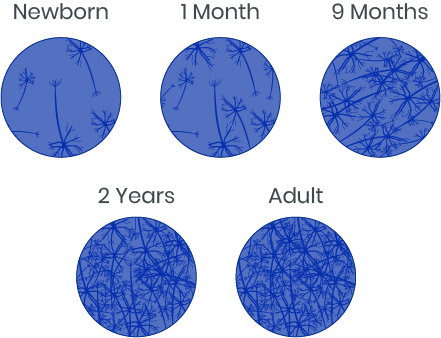Healthy Parent-Child Relationships
“There is no such thing as a baby. There is a baby and someone.”
– Dr. Donald Woods Winnicott
Children need nurturing care and strong, stable relationships to grow.
For infants, the best start in life begins with well-established bonds with caregivers and the fulfillment of basic needs such as nutrition, stimulation, and a safe home environment.
In early childhood, at least one million new neural connections are made every second, which is more than at any other time in life. By engaging in stimulating, nurturing care with children at this crucial stage, parents and caregivers can help lay the necessary groundwork for a child’s lifelong learning, health, and behavior .
By engaging with their children through serve and return interactions, parents can provide the foundation for healthy brain development and future learning. Babies learn to feel comfortable, safe, and secure in the world when their caregivers respond to their signals and create a trusting bond by addressing their needs.
This, in turn, allows the child to experiment, explore, and take the types of risks that support healthy brain development.

Postnatal Development of the Human Cerebral Cortex30
“When an infant or young child babbles, gestures, or cries, and an adult responds appropriately with eye contact, words, or a hug, neural connections are built and strengthened in the child’s brain that support the development of communication and social skills… when caregivers are sensitive and responsive to a young child’s signals and needs, they provide an environment rich in serve and return experiences.”
– Center on the Developing Child at Harvard
Positive parent-child relationships:
-
Support healthy brain development
-
Teach young children how to problem-solve, cope, and manage emotions
-
Increase school readiness and early learning skills
Loving relationships with responsive, dependable adults support the development and wellbeing of young children. Parenting programs can help strengthen these relationships by building on caregivers’ existing strengths and introducing new approaches for parents and families of young children. Coordinated supports for families (for example through home visiting programs, universal screening and referral programs, and access to early childhood care and learning opportunities) help develop a home environment that fosters healthy development for young children. Even investments in inexpensive, short-term interventions have been proven to improve long-term outcomes for mothers, children, and families.
To support healthy parent-child relationships the Burke Foundation invests in promising and evidence-based programs that:
-
Capitalize on existing strengths to build the capacity of adult caregivers
-
Replicate, modify, and scale home environment and parenting interventions
-
Connect families with community resources and strengthen social supports and networks
-
Accelerate language development and support language-rich environments
-
Support policies around basic needs support, child welfare, home visiting, and paid leave
“Investments that bolster the parenting capacities of families are the most effective way to promote social mobility and foster equal opportunities.”
– James Heckman, Nobel Laureate in Economic Sciences in 2000
